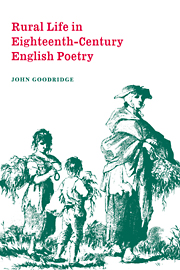Book contents
- Frontmatter
- Contents
- Preface
- Abbreviations, conventions, textual note
- Introduction
- Part I ‘Hard labour we most chearfully pursue’: three poets on rural work
- 1 Thomson, Duck, Collier and rural realism
- 2 Initiations and peak times
- 3 Three types of labour
- 4 Compensations
- 5 Homecomings
- Part II ‘A pastoral convention and a ruminative mind’: agricultural prescription in The Fleece, I
- Appendix A ‘Siluria’
- Appendix B Eighteenth-century sheep breeds
- Notes
- Select bibliography
- Index
- CAMBRIDGE STUDIES IN EIGHTEENTH-CENTURY ENGLSH LITERATURE AND THOUGHT
5 - Homecomings
Published online by Cambridge University Press: 30 October 2009
- Frontmatter
- Contents
- Preface
- Abbreviations, conventions, textual note
- Introduction
- Part I ‘Hard labour we most chearfully pursue’: three poets on rural work
- 1 Thomson, Duck, Collier and rural realism
- 2 Initiations and peak times
- 3 Three types of labour
- 4 Compensations
- 5 Homecomings
- Part II ‘A pastoral convention and a ruminative mind’: agricultural prescription in The Fleece, I
- Appendix A ‘Siluria’
- Appendix B Eighteenth-century sheep breeds
- Notes
- Select bibliography
- Index
- CAMBRIDGE STUDIES IN EIGHTEENTH-CENTURY ENGLSH LITERATURE AND THOUGHT
Summary
The cottage door
Duck's haunted dreams, though he allows his sense of the absurd to modulate them, are disturbing. His apostrophe to:
Hard Fate! Our Labours ev'n in Sleep don't cease;
Scarce Hercules e'er felt such Toils as these!
(p. 11)is informed by the idea that something is very wrong, which he expresses in indignation, and translates with Duckian decorum into classical allusion. What is ‘wrong’, in cultural terms, is that in eighteenth-century portrayals of labour, home is the ultimate compensation, the symbol of warmth, food, safety, comfort, nurture and the ‘miniature kingdom’ of family. ‘Coming home’ is a tradition that stretches back through Western literature: to The Odyssey (whose hero conquers all enemies, braves all seductions and turns down at least one Utopia in order to get home); and to Sappho, whose pastoral lyric addressed to the evening star encapsulates this pervasive theme exquisitely:
Hesperus, you bring everything that
the light-tinged dawn has scattered;
You bring the sheep, you bring the goat, you bring
the child back to its mother
In Duck's world no place is sacred: not his home, nor even his bed: his mind itself is invaded by his labour. (Orwell's 1984 makes the modern reader especially sensitive to this ultimate horror.) The ‘wrongness’ of this is informed by Duck's understanding that a major cultural icon is being upturned by his work; and I shall complete this examination of the way the three poets portray rural labour by looking at their approaches to homecoming scenes, to see how they reflect their ideas and feelings about rural labour, and rural life.
- Type
- Chapter
- Information
- Rural Life in Eighteenth-Century English Poetry , pp. 71 - 88Publisher: Cambridge University PressPrint publication year: 1996

